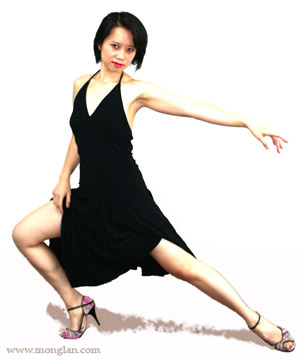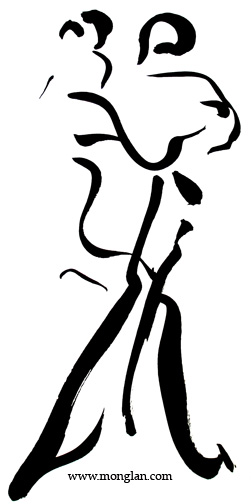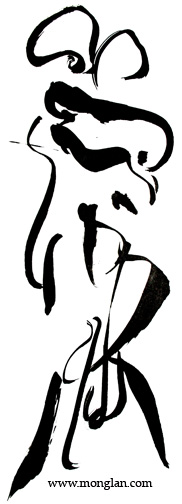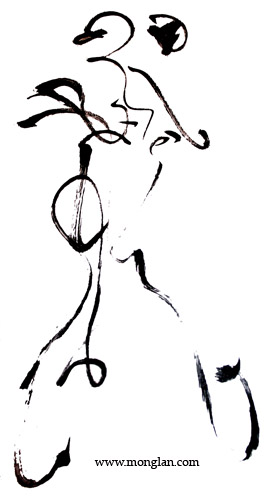

behind the image, the imagination ---Mong-Lan
|
|
|
|
English language edition 132 pages of scintillating poetry and art. |
Tango, Tangoing: Poems & Art(Tango, Tangueando: Poemas & Dibujos--edición bilingüe español-inglés; bilingual edition, Spanish-English) click here. In her exquisite, recently published poetry and art book, Tango, Tangoing: Poems & Art, the Vietnamese-American writer, visual artist, and Argentine tango dancer, Mong-Lan explores and exposes that most alluring, most magical of dances, the Tango. Only a woman, and perhaps a woman who is neither Argentine, nor even of European background, could have approached tango, and those caught in its web, as does Mong-Lan in Tango, Tangoing. With haunting words and elegant pen and ink drawings, Mong-Lan guides the reader into a dance world that touches upon Argentina's recent tragic history and that mingles leader and follower, love and heartbreak, all within the embrace and intricacies of the Tango. |
What poets and critics are saying:"A mesmerizing accomplishment - four voices at their climax: the dance, if we can call it that, the physics of being, the history and manual of dark beauty and the voleos of line, ink, stanza and voice, layers of loss, desire and the body in ecstatic explosions. Three drops of Lorca, one tincture of María Luisa Bombal and a full vasija of Mong-Lan, a masterpiece, señores y señoras. A mathematics of fire." -- Juan Felipe Herrera, U.S. Poet Laureate, 2015- "While the ostensible subject here is dance, Mong-Lan is brilliant at suggesting layered, ever-shifting perspectives, meanings, and voices. These complex poems are, at times, aesthetic mediations, dissections of human relationships, internal monologues, and political inquiry. That Mong-Lan succeeds at such an ambitious project in writing that is visually striking, musically complex, unabashedly erotic and deeply intelligent, is testimony to her very great poetic talents. This is a marvelous book, one I’ll return to again and again."--Kevin Prufer, poet, critic, Univ. of Houston |
 |
|
"Mong-Lan’s lyric poetry is unlike any others. The work sings, but it is not music alone that moves us; it’s what we experience through the speaker’s observational accuracy and emotional wisdom: “The oscillatory / foolish / the insane / make their way / into tangos” and “I would find you / locked in a mosquito’s eye.” Consisting of three extraordinary poems about Argentine tango, the work is “muy generoso,” as she quotes the dance itself as being, in its sweep and precision. The poems are not merely illustrative of the dance’s famous forwardness; they reveal the transformative power of the commitment the dance requires: the finding of rhythm with another at the edge of mayhem, even as stillness is created at the center of the ochos, emblems of infinity, the dancers create on the floor."--Paul Hoover, poet, professor, San Francisco State University If strict steps insist, feet, face, arms and torso fit into a great tradition's design, who better than Mong Lan might insist we take to her desires to take care of traditions of all kinds. Combinations of music, bodies in action, poetry in motion, lend themselves to a book examining love, desire, fulfillment and accuracy of execution. There's knowledge in this book, passionate resolution and meditations exacting. – Dara Wier, poet, professor "Improvisatory, epigrammatic, sensual, meditative, and always generous, Mong-Lan celebrates, as well as dissects, the intricacies and implications of the tango. Interweaving art with verse, this collection will leave you breathless from its impassioned elaborations and imagistic intensity."--Cyril Wong, poet, Singapore |
 |
|
"I have a way of thinking about the Mong-Lan enterprise. Tango is poetry, is a calligraphy of the body, a series of movements and freeze-frames also suggested by the dispersed lineation of the poem on the page. So that a linear equivalent of ochos, backward and forward steps, and voleos can be discerned in the arrangement of the lines. I know that Pollock thought of his 'Action Painting' as a kind of dance, and films of him at work show him jumping about and waving his arms in an agile way. To succeed at calligraphy you must practice over and over until the arm and hand move without hesitation, instinctively. And it is the same with the dance. This is work that is inseparable from virtuosity. It's instructive, too, that she places Porteño tango in a context of poverty and melancholy. The dance becomes a kind of pain-killer, helping participants forget all that is irreparably sad about their lives. Obviously it has a relationship to love and sex, too, but not a direct correspondence, since you can have great partners for the dance that you don't see elsewhere. It is an abstraction of love/sex. An impressive performance."--Alfred Corn, poet, professor.
From The Argentimes, May 2008, Buenos Aires:
|
 |
|
From El Tangauta, June, 2008, Buenos Aires, translated from the Spanish: From TimeOut Buenos Aires: “The latest publication from celebrated US poet and artist Mong-Lan, Tango, Tangoing: Poems & Art, is a beautifully crafted collection of poetry and artwork, capturing the flavours of Argentinian tango through three sections of free verse interwoven with fluid pen and ink drawings."
Poetry Selections from the book:
|
 |
|
Audio: Listen to Mong-Lan recite her tango poem, with music: |
|
|
Tangoing
In Buenos Aires the tangueros are tangoing to the bandoneón’s beat violin’s abandon seductive net of music
Dancing with a restrained wildness cunning controlled hearts full
elegantly these men & women elegantly these bellies proudly protruding beef-eating dancing to the sensual tango
Most are genteel & do not steal other’s partners do not stow knives in their blood
Gliding to the bandoneón’s breath
pivoting swift turns slow smooth bitter wild excited blind turns
Spinning night to dawn their love-lives gouged on their faces desperate lines deeply milongueros expose the history of Argentina on their visages
Dancing rhythms that bodies unravel an unending night unparalleled oblivion & desire
desire to forget the lives
of misery To forget Menem the military dictatorship disappearances life-savings & bonds lost
~
In the bay of Río de la Plata tango was born 100 yrs ago & carries on The tango of the lower classes tango of the chic often happens at night in la madrugada From Africa came its syncopated rhythms—
~
The night continues endlessly I begin life over the questions of my life come to me in dreams The questions come & go The dances went & came The men came & went
~
The destitute suddenly poorer come & go at night They sift through trash take paper cardboard & recyclables away leaving disposable trash pilfered like feathers receiving a few pesos for a few kilos
Courteous some say Buenas Noches with soft eyes Women & children barrel away paper Men cart away paper Trash picked at vultures at dead bodies
~
Cab drivers do not have change for a 20 peso bill A lack of effectivo
Anapestic by magic the city the nation & its citizens keep on
Where is the fire?
At night fire burns in trash bins on city streets a huge pyre waiting for its sacrifice
~
Out until 5 or 6 in the morning milongueros embrace sucking each other’s blood They lean towards each other’s hearts plucking Perhaps they will follow each other home devour the other
Drinking each other’s glances & stares deriving pleasure in dancing embracing kicking between each other’s legs on crowded floors
Eyes scan: whom to dance with whom to avoid?
Tables & tables of hungry women predatory men courteous disdainful
Around & around people draw ochos flick voleos flicks of knives
~
Walls crumbling
I begin life over I start to read skies leaves dawn The questions of my life float to me in tangos The questions come & go the dreams the men & women
[Buenos Aires, 2001-2004]
|
|
Video: 2009 Buenos Aires International Book Fair -- La Fería del libro de Buenos Aires: Mong-Lan reads from Tango, Tangoing: Poems & Art (Tango, Tangueando: Poemas & Dibujos). Invited by the American Embassy in Buenos Aires.
|
Copyright © 2001-2020 by Mong-Lan. All rights reserved. Website created by Mong-Lan. Please respect the fact that all artwork, writing, poetry, and music (except where indicated), on this website are copyrighted by Mong-Lan. It may not be stored, displayed, published, reproduced, without her written permission.